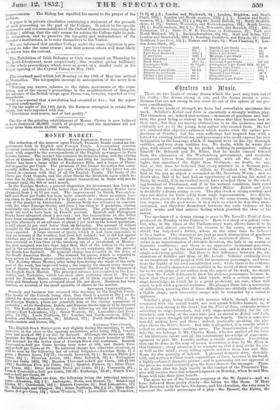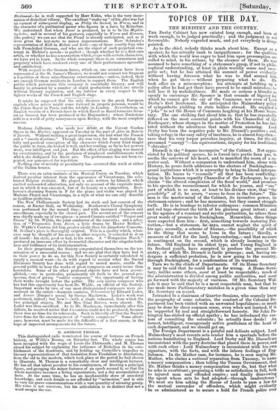tratrro nut( 311noir.
There are two kinds of strong drama which the poet may turn out of his studio,—the drama strong in ease, and the drama strong in posse, Dramas that are not strong in any sense lie out of the sphere of our pre- sent consideration.
Of the two kinds of strength we have had remarkable specimens this week. Schiller's .Kabale and Liebe is essentially a strongly written play. The characters are indeed abstractions,—monsters of goodness and bad- ness, the good being so violent in their virtue that they become bad in their turn ; but they are merely abstractions to us the audience, and are evidently not so to the young fiery author who created them. He hail not attained that objective calmness which marks even the earlier pro- ductions of Goethe ; but his own sufferings had inspired him with a hatred for existing institutions, and personages who could express hi own indignation in the language which it inspired weie in his eye thorough realities, and very stern realities too. No doubt, while he wrote this play, with almost nothing in his pocket, nothing in perspective, calling himself Dr. Schmidt and Dr. Ritter, that he might conceal himself from the emissaries of the Wurtemberg government, and receiving unpleasant letters from theatrical patrons, with all the other de- lights that signalized the flight from Stuttgart,—no doubt, we say, that at this time he believed that every minister in a German prin- cipality was as consummate a villain as President von Walter, and had in his pay as abject a scoundrel as Mr. Secretary Wurm ; and no doubt also, that if he had had an opportunity of speaking his mind to them, he would, if in an exalted mood, have attacked them in the swell- ing bombast of Ferdinand, and if in his natural condition, have rated them in the strong low vernacular of father Miller. Kabak end Liebe is decidedly a drama strong in ems. The play-book is strong reading, and does not derive its force solely from stage representation. .Don Karla', which was given on Saturday, is strong for the same reason, though in a less degree ; for the poet wrote it in a style to which he was then unac- customed, and therefore floundered between the rude violence of his earlier works and that artistic feeling which glorified the close of his career.
The specimen of a drama strong in posse is Mr. Lovell's Trial of Love, produced on Monday at the Princess's. Here is a story of a gallant cava- lier, who, in the times of the Parliamentary wars, allows himself to be accused and almost executed for treason to his cause, on purpose to shield his lady-love's father, whom at the same time he believes to be a traitor. The characters are just as much abstractions of goodness and badness as Ferdinand, Wurm, and Co. mentioned above. The ca- valier is an impersonation of chivalric devotion, the lady is an avatar of feminine confidence ; and there is an oppressive lieutenant-governor, who turns out to be the real traitor at the end, and is drawn without a single redeeming quality. But there is this difference between the ab- stractions of Schiller and those of Mr. Lovell : Schiller evidently lived in an imaginary world peopled with his monstrous personages, and wrote from the depths of his own uncultivated soul ; while there is no evidence that Mr. Lovell's characters are realities in the mind of their creator. As far as we can judge of our author from the aspect of his work, we should say that Mr. Lovell deliberately drew his abstract personages because he knew that they are just of the kind which, with a certain amount of stage-knowledge, in which he is a great proficient, are sure, when well acted, to tell with a general audience. He plunges them into a succession of difficulties, knowing that if these difficulties are skilfully clothed with a visible shape, each successive escape will be rewarded by a round of applause.
Schiller's play, being filled with persons which, though shadowy as compared with the actual world, are real quoad Schiller himself, is, as we have said, strong in the closet ; but the Thal of Love, evidently written according to stage-precedent, and with stage-practicability for its sole standard, and being at the same time just as unreal as labels foul Liebe, does not regain strength till it steps upon the boards. There is some nice tasteful writing hero and there ; indeed, poetically speaking, the play
rises above the Wife's Secret. But take it altogether, it is exactly what is called an acting drama—nothing more. The transformation of the posse
into the ease belongs to Mr. Charles Kean, who has applied all the force of his histrionic talent and all his consummate knowledge of stage-man- agement to give Mr. Lovell's outline a visible substance. Evegthing that can be done in the way of scenic decoration is done by Mr. Kean in this instance ; every situation is so wrought up that it may strike the eye as well as the mind ; every telling speech receives from him and Mrs. Kean its due quantity of Aplomb. A pleasant dramatic story, sketchily told, and written without much expenditure of force, becomes in his hands a highly-coloured dramatic picture ; and in portioning out our approval of
the piece we would certainly give the lion's share to the manager. There is no doubt that his high merits in the conduct of the Princess's The- atre will receive their due acknowledgment on Monday, when he and Mrs. Kean will take their joint benefit The more we see of the German company at the St. Yames's—and we have followed them pretty closely—the better we like them. If Herr F.mil Devrient is by his face, his figure, and his elocution, the very man to represent the nobler personages of a play—the Egmont, the lanes, the Ferdinand—he is well supported by Herr Kiihn, who is the very incar- nation of diabolical villany. The excellent" make-up" of his Aka was but an earnest of subsequent display, as PhiTip the Second, in Warns, and in the character of a puritanical pastor who figures in a farce by Kotzebue. We understand that when Faust is produced, he is to be the Mephis- topheles; and in several of his gestures, especially in Warm and Krumm, (the pastor,) we can see that the Fiend is already anticipated, and as it were gives the key-note to minor impersonations. Herr Schrader's representation of Kalb in labels and Liebe—one of those courtly fops who talk Frenchified German and who are the object of such perpetual con- tempt in Richter's novels-is perfect ; though whether he is a first-rate artist, or whether he has a mannerism which jumps with certain characters, we have yet to learn. In the whole company there is an earnestness and propriety which have rendered every one of their performances agreeable and satisfactory.
With respect to the German farces, which on one occasion have been represented at the St. James's Theatre, we would not counsel too frequent a repetition of these miscellaneous entertainments,—unless, indeed, their are enough German residents in London to support them. The English public which patronizes this company is essentially literary, and will hardly be attracted by a number of slight productions which are utterly without literary reputation, and are inferior in every respect to the lighter works of the French and English stage.



























 Previous page
Previous page